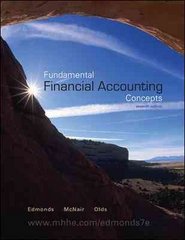Answered step by step
Verified Expert Solution
Question
1 Approved Answer
Carl Kay is the vice-president of KM Ltd., a Canadian-controlled private corporation located in Halifax, Nova Scotia. KM operates a real estate development business constructing
Carl Kay is the vice-president of KM Ltd., a Canadian-controlled private corporation located in Halifax, Nova Scotia. KM operates a real estate development business constructing and selling commercial buildings and residential apartments. Carl's 2021 financial transactions include the following:
- Carl receives a salary of $104,500 from KM. From this amount, KM deductedEI and CPP of $4,056 (includes CPP enhanced contributions of $290) and income tax of $21,000. The company provides him with a car that cost $35,000 and that has an undepreciated capital cost of $18,000. The operating costs of $3,000 were paid by KM. In 2021, Carl drove the car 20,000 km, of which 9,000 km was for employment purposes. KM contributed $4,000 on Carl's behalf to a deferred profit sharing plan. Although KM does not have a group life insurance plan, it paid Carl's personal life insurance premium of $1,100 (coverage - $75,000).
- During the year, Carl sold 1,100 shares of KM Ltd. for $10 per share. He had acquired the shares three years earlier for $6 per share as part of a company stock-option plan. At the time of purchase, the shares were valued at $7 per share.
- In 2021, Carl constructed a 10-suite apartment block. He sold the property in 2021 for $800,000, which was $200,000 more than the original land and building cost. He received $80,000 of the proceeds in cash, with the balance due in five annual instalments beginning in 2022. The property incurred a net rental loss of $7,700 (before amortization).
- Carl sold his summer cottage for $99,000 after it was announced that a waste disposal site would be developed in the area. He purchased the cottage six years earlier for $120,000.
- In 2018, Carl loaned $18,000 to Alloy Ltd., a Canadian-controlled private corporation. All of the company's assets are used in an active business. The 2020 interest of $1,500, which Carl included in income, has not been received. The company is in severe financial difficulty and may not survive beyond next year.
- Carl sold shares of a public corporation, purchased in 2020 for $13,200, for $22,000.
- In November, Carl received a legal bill for $2,200 relating to a dispute over a tax reassessment. Carl paid $1,300 in December 2021 and the balance in January 2022.
- Carl received Eligible dividends of $2,200 and Non-eligible dividends of $1,100 from Canadian corporations and $1,800 from a foreign corporation. The foreign corporation remitted a 10% withholding tax to its government.
- Carl celebrated his 65th birthday in December 2021. He supports his spouse, who is retired. His spouse has interest income of $3,000 in 2021. During the year, Carl made gifts of $4,000 to a local charity. He paid tuition fees of $800 to attend a 3-month evening course at a university.
- Carl has used his entire capital gain deduction. At the end of 2021, he has unused net capital losses of $12,000 and non-capital losses of $7,000.
Required: Calculate Carl's 2021 net income for tax purposes, taxable income, and federal income tax.


Step by Step Solution
There are 3 Steps involved in it
Step: 1

Get Instant Access to Expert-Tailored Solutions
See step-by-step solutions with expert insights and AI powered tools for academic success
Step: 2

Step: 3

Ace Your Homework with AI
Get the answers you need in no time with our AI-driven, step-by-step assistance
Get Started


